Business reporter and transportation correspondent
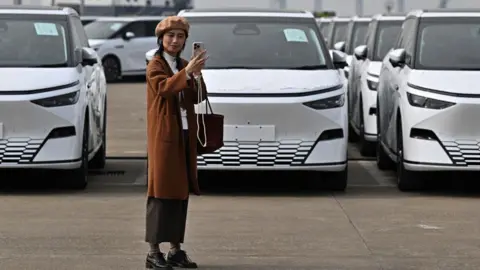 Getty image
Getty imageLu Yunfeng, a personal rental driver in a charging station outside the Guangzhou, southern China, said, “I am driving an electric car because it is poor.”
Sun jingguo stands nearby and agrees. “The cost of driving in the gasoline car is too expensive. It saves money to drive electric cars,” he said.
“It also protects the environment,” he added.
It is a kind of dreams that conversation climate activists listen to. In many countries, electric vehicles (EVS) are considered high -end purchases.
But in China, which was almost half of all cars sold last year, it is a normal reality here.
‘King of Hill’
At the beginning of the century, China’s leadership planned to dominate the future technology. The country of bicycles, China, is the world leader of EVS.
For more than 18 million people in Guangzhou, Rush Hour’s roar was buzzing.
Michael Dunne, an analyst in the automotive sector, said, “As for EVS, China is 10 times better 10 years ahead 10 years ahead of other countries.”
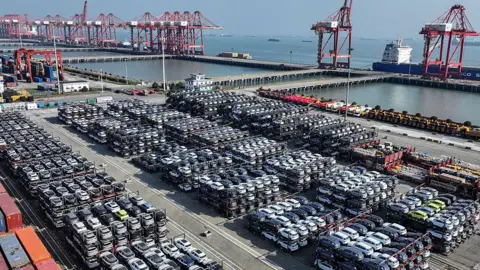 Getty image
Getty imageChina’s BYD is currently leading the global EV market after surpassing US rival Tesla earlier this year.
BYD’s sales have been helped by the vast domestic market with more than 1.4 billion people and are now trying to sell more cars abroad. The same is true of the rafts of other Chinese new companies that make cheap EVs in the mass market.
So how did China build this lead and catch it?
Master Plan
Analysts often credited Wan Gang, a German training engineer who became the Minister of Trade, Trade and Science in 2007 when tracking the origin of China’s EV domination.
“He looked around and said,” Good news: We are now the largest automotive market in the world. Bad news: Guangzhou brand is a foreign brand in the streets of Beijing, Shanghai, and Guangzhou, “Dunne says.
At that time, Chinese brands could not compete with European, US and Japanese automakers for quality and reputation. These companies have headstarts that are not corresponding to producing gasoline or diesel drive vehicles.
But China had sufficient resources, experienced labor and ecosystems in the automotive industry. According to Dunne, Mr. WAN said, “We decided to change the game and move to electricity to turn the script upside down.”
This was a master plan.
The Chinese government included EVs in the five -year economic blueprint in early 2001, but until the 2010s, it did not begin to provide a vast amount of subsidies to grow the industry.
Unlike the West, China Democracy has the ability to mobilize the economy of the economy over the years.
The mammoth infrastructure project and the dominance of manufacturing in this country are evidence of this.
The US Think Tank, a strategy and international research center (CSIS), estimates that it spent about $ 23.1 billion (£ 17.2 billion) to develop the EV industry from 2009 to the end of 2023.
From consumers and automakers to electrical suppliers and battery suppliers, everyone in China deserves money and support for EVS.
For example, BYD recommended a transition focused on EV production in smartphone battery production.
Ningde -based CATL, which supplies companies such as Tesla, Volkswagen and Ford, was founded in 2011 and is currently producing one -third of all batteries used in EVs around the world.
The combination of these long -term plans and government funding allowed China to dominate important supply chains in battery production.
It helped to build the world’s largest public charging network with stations concentrated in a big city, which was a few minutes from the nearest charger.
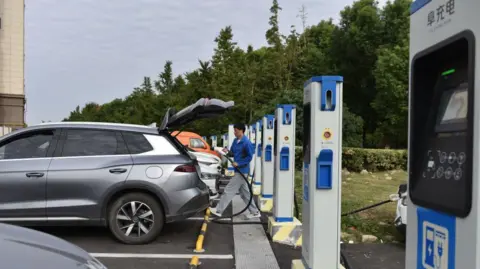 Getty image
Getty imageDunne said, “All roads pass through China to manufacture batteries in electric vehicles today.
Some are called “national capitalism.” Western countries call it unfair business practices.
China’s EV executives argue that all domestic or foreign companies can access the same resources.
As a result, China now claims that it has a prosperous EV startup division due to fierce competition and innovation culture.
Brian Gu of EV Maker XPeng said, “The Chinese government is doing the same thing in Europe and the United States.
“But I think it has done it in a way that China consistently and promotes the most competitive landscape. Everyone has no favor.”
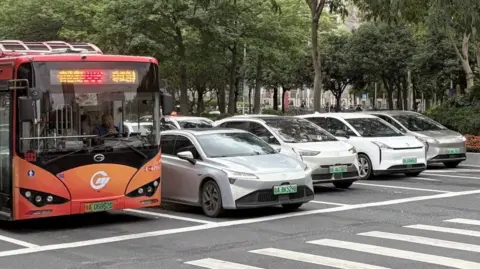 Annabelle Liang
Annabelle LiangXpeng is one of the “Chinese champions” as GU said. Although it has not gained profits almost 10 years later, startups are already in the world’s top 10 EV producers.
The company attracted some of the best young graduates in China to the headquarters in Guangzhou, where the staff dressed naturally gathered flat white and sold the lively cars in the showroom.
The brightly colored slides that take employees from the top to the first floor will be seen more at the house in Silicon Valley than in China’s industrial heart.
Despite the comfortable atmosphere, GU says that the pressure to provide a better car at a lower price to consumers is “huge.”
The BBC was invited to the test drive of XPEPENG’s MONA MAX and sold for about $ 20,000 in China.
To get this price, autonomous driving, voice activation, lying flat beds, movies and music streaming are provided. Young Chinese graduates see everything as the standard function for the first car purchase.
David Li, co -founder and chief executive of HESAI, said, “The new generation of EV manufacturers see cars as other animals.
‘EV understands for me’
According to CSIS studies, Chinese consumers are certainly fascinated by the best technology, but there is a huge amount of government spending on making EVS attractive.
The public members receive subsidies for transactions for EVs in non -electric vehicles, and receive subsidies from tax exemptions and public bills.
This privilege drove Mr. LU to go to electricity two years ago. He paid 200 yuan ($ 27.84; £ 20.72) to fill the car with 400 km (248 miles). Now is one quarter of that cost.
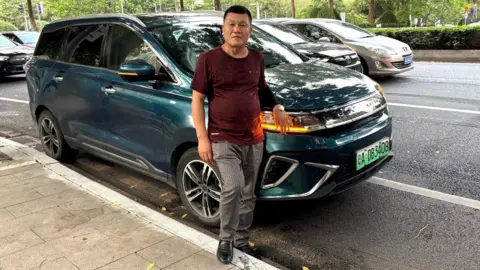 Annabelle Liang
Annabelle LiangPeople in China generally pay thousands of dollars on the vehicle registration board (sometimes more than the cost of the vehicle itself) as part of the government’s efforts to limit congestion and pollution. LU now gets his green for free.
Mr. LU said, “Rich resources are unlimited, so they drive rich gasoline cars.” EV is just meaningful to me. “
Another proud EV owner in Shanghai, who wanted to use an English name Daisy, says he is changing the battery of the car in one of the many automatic swap stations in the city provided by EV Maker NIO without charging the vehicle in the station.
In three minutes, the machine replaces the flat battery with a completely charged battery. It is art technology less than fuel tank prices.
Road in the future
The government’s subsidies at the center of EV growth in China are considered unfair in countries that want to protect the automotive industry.
The United States, Canada and the European Union all imposed significant income tax on the Chinese EV.
But the United Kingdom said he would not try to follow the lawsuit. The attractive market of a company like Xpeng began to provide a G6 model to British consumers in March, and BYD launched a Dolphin Surf model in the UK this month and is available for $ 26,100.
This must be music to the ears of the Western government, which enthusiastically supports the transition to EVS, which is called “central” to avoid climate disasters.
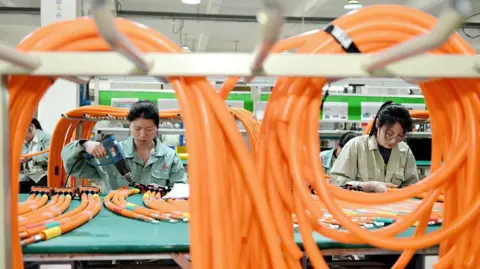 Getty image
Getty imageSome Western countries, including the UK, said they would ban gasoline and diesel cars by 2030.
Dunne said, “The Chinese are thinking about the future of manufacturing almost all cars for the world. They can do better than us?
“The leaders of Nagoya Detroit, Germany, are shaking their heads anywhere in the world. It’s a new era and the Chinese feel very confident about the current outlook.”
Despite the environmental advantage, there is still doubt about being able to rely on Chinese technology.
Sir Richard Dearlove, former British MI6 officer, recently called “Computer” on the “China EVS” wheel that can be controlled in Beijing.
China’s EVS could someday fix British cities.
“Everyone can claim anything if you lose the game. But what is it?” She said.
“BYD pays a very high level of data security. We use local airlines for all data. In fact, we were 10 times better than our competitors.”
Nevertheless, concerns about Sir Richard reflect the previous national security discussions surrounding Chinese technology.
This includes HUAWEI, a communication infrastructure manufacturer that has been banned from equipment in several Western countries, and a social media app that is prohibited from the British government device.
However, the message is simple for Sun Jingguo in Guangzhou.
“I think I should thank China for bringing this technology to the world.” “is it so.”
Additional report of Theo Leggett, London International Business Correspondent.



